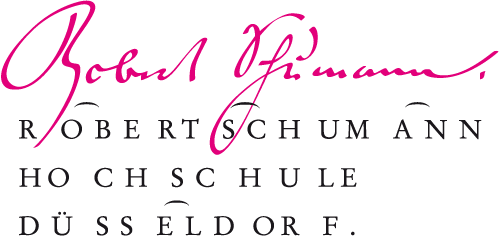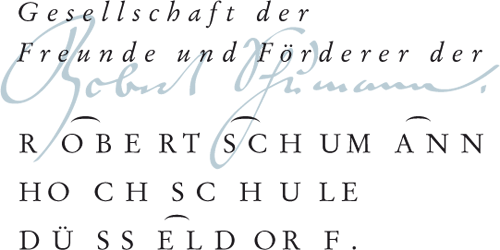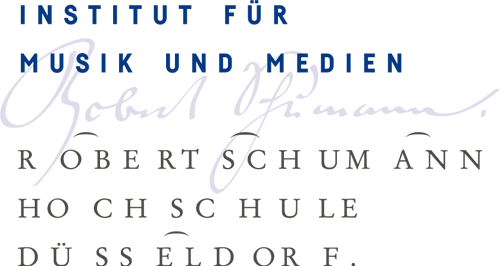Klang und Realität
Master of Music [M.Mus]
Addressing the challenges of our time, the Robert Schumann School of Music and Media Düsseldorf plays an active part in contemporary social and technological developments. Besides preserving tradition and knowledge, the music conservatory also shapes the present and the future. This is exemplified by the pioneering Klang und Realität master’s degree program at the university’s Institute For Music And Media. The master’s degree program offers students the opportunity to cooperate with outstanding theorists and practitioners and work together on the latest areas of research in music, the arts, science and society.
A UNIFIED RESEARCH AND TEACHING APPROACH
Following the principle of the unity of research and teaching, the Klang und Realität master’s degree program combines aesthetic, technical and theoretical approaches. The program benefits from the unique academic situation at the Institute For Music And Media: the multiple facets of time-based art, such as composition, performance, and algorithmic art forms, have been established here for many years.
IMM students autonomously develop their own stance, and learn to integrate it with a range of artistic, technological, economic, scientific and cultural contexts. Graduates of the Klang und Realität master’s degree program are ideally prepared to shape, influence, advance and even anticipate developments in the 21st century.
MAJOR CONCENTRATION EPISTEMIC MEDIA
The Epistemic Media major concentration anchors inde- pendent modes of inquiry and knowledge within a variety of media forms. Possible orientations for research projects are, for example:
a) Experimental artistic approaches or the development of methods
b) Interactions with other disciplines and work at the interface between art and science
c) Art as epistemic endeavor.
MAJOR CONCENTRATION TRANSMEDIA FORMS
The Transmedia Forms major concentration is intended in particular for students pursuing artistic and compositional interests. Movement, change and oscillation are the basis of time-based art forms, with technical procedures closely interacting with new forms of artistic expression. Possible areas of projects include for example:
a) The interfaces between media (e.g., audio and video)
b) The relationship between movement and its conditions (e.g., composition and improvisation)
c) The composition of time-based sequences (e.g., narrationand dramaturgy).
OPEN FOR ALL DISCIPLINES
Musicality is not attached to musical instruments exclusively – it includes many aspects of artistic and scholarly work. That is not least of all the reason why this degree program is generally open to graduates from all disciplines. The scope of musical form is constantly increasing, within and even beyond the auditory and visual. The Klang und Realität master’s degree program is therefore particularly appropriate for those who are interested in a wide range of topics, media forms and schools of thought.
PROJECT WORK AS CENTRAL ASPECT OF STUDIES
The institution of a Musikhochschule is ideally suited for promoting exchange among interests and abilities in different domains. Student projects play a vital part in this exchange. In the course of their studies, students learn to reconceptualize their proposed project on the basis of critical and differentiated feedback and to bring it to fruition at a high level through collaboration with other students. They carry out their project in one of two areas of focus – Epistemic Media or Transmedia Forms – both of which open up completely new perspectives in the environment of a state conservatory.
THE THEORETICAL AESTHETIC AND TECHNICAL CONTEXT
To foster interdisciplinary exchange and closely link research to teaching, the largely elective coursework for the Epistemic Media and Transmedia Forms concentrations overlaps considerably. The two specializations provide the theoretical, artistic and technical background indispensable for artistic and research practice at a high level.
COOPERATION IN PROJECTS
Giving insight into the candidate’s interests, motivation and skills, a detailed project proposal is evaluated as part of the qualifying exam. The proposal also provides a basis for the experimental development of the project during the first year of study. During this open discovery phase, a consistent project design is developed and then implemented during the second year. Students work together throughout the entire process, which is accompanied by a regular colloquium.
ADMISSION REQUIREMENTS AND APPLYING
The equivalent of a bachelor’s degree is the minimum qualification for the Klang und Realität master’s program. Applicants for this course of study apply by submitting a project proposal: with a description of the initial questions to be studied, goals and methodology, as well as – and this is important – sub-areas where other students could conceivably cooperate. The application must also include a statement of why specifically this master’s program is being applied for as well as a portfolio of artistic or scientific work.
For further questions please contact the course coordinator Heike Sperling
Addressing the challenges of our time, the Robert Schumann School of Music and Media Düsseldorf plays an active part in contemporary social and technological developments. Besides preserving tradition and knowledge, the music conservatory also shapes the present and the future. This is exemplified by the pioneering Klang und Realität master’s degree program at the university’s Institute For Music And Media. The master’s degree program offers students the opportunity to cooperate with outstanding theorists and practitioners and work together on the latest areas of research in music, the arts, science and society.
A UNIFIED RESEARCH AND TEACHING APPROACH
Following the principle of the unity of research and teaching, the Klang und Realität master’s degree program combines aesthetic, technical and theoretical approaches. The program benefits from the unique academic situation at the Institute For Music And Media: the multiple facets of time-based art, such as composition, performance, and algorithmic art forms, have been established here for many years.
IMM students autonomously develop their own stance, and learn to integrate it with a range of artistic, technological, economic, scientific and cultural contexts. Graduates of the Klang und Realität master’s degree program are ideally prepared to shape, influence, advance and even anticipate developments in the 21st century.
MAJOR CONCENTRATION EPISTEMIC MEDIA
The Epistemic Media major concentration anchors inde- pendent modes of inquiry and knowledge within a variety of media forms. Possible orientations for research projects are, for example:
a) Experimental artistic approaches or the development of methods
b) Interactions with other disciplines and work at the interface between art and science
c) Art as epistemic endeavor.
MAJOR CONCENTRATION TRANSMEDIA FORMS
The Transmedia Forms major concentration is intended in particular for students pursuing artistic and compositional interests. Movement, change and oscillation are the basis of time-based art forms, with technical procedures closely interacting with new forms of artistic expression. Possible areas of projects include for example:
a) The interfaces between media (e.g., audio and video)
b) The relationship between movement and its conditions (e.g., composition and improvisation)
c) The composition of time-based sequences (e.g., narrationand dramaturgy).
OPEN FOR ALL DISCIPLINES
Musicality is not attached to musical instruments exclusively – it includes many aspects of artistic and scholarly work. That is not least of all the reason why this degree program is generally open to graduates from all disciplines. The scope of musical form is constantly increasing, within and even beyond the auditory and visual. The Klang und Realität master’s degree program is therefore particularly appropriate for those who are interested in a wide range of topics, media forms and schools of thought.
PROJECT WORK AS CENTRAL ASPECT OF STUDIES
The institution of a Musikhochschule is ideally suited for promoting exchange among interests and abilities in different domains. Student projects play a vital part in this exchange. In the course of their studies, students learn to reconceptualize their proposed project on the basis of critical and differentiated feedback and to bring it to fruition at a high level through collaboration with other students. They carry out their project in one of two areas of focus – Epistemic Media or Transmedia Forms – both of which open up completely new perspectives in the environment of a state conservatory.
THE THEORETICAL AESTHETIC AND TECHNICAL CONTEXT
To foster interdisciplinary exchange and closely link research to teaching, the largely elective coursework for the Epistemic Media and Transmedia Forms concentrations overlaps considerably. The two specializations provide the theoretical, artistic and technical background indispensable for artistic and research practice at a high level.
COOPERATION IN PROJECTS
Giving insight into the candidate’s interests, motivation and skills, a detailed project proposal is evaluated as part of the qualifying exam. The proposal also provides a basis for the experimental development of the project during the first year of study. During this open discovery phase, a consistent project design is developed and then implemented during the second year. Students work together throughout the entire process, which is accompanied by a regular colloquium.
ADMISSION REQUIREMENTS AND APPLYING
The equivalent of a bachelor’s degree is the minimum qualification for the Klang und Realität master’s program. Applicants for this course of study apply by submitting a project proposal: with a description of the initial questions to be studied, goals and methodology, as well as – and this is important – sub-areas where other students could conceivably cooperate. The application must also include a statement of why specifically this master’s program is being applied for as well as a portfolio of artistic or scientific work.
For further questions please contact the course coordinator Heike Sperling
Robert Schumann Hochschule Düsseldorf Fischerstraße 110, 40476 Düsseldorf
Fon: +49.211.49 18 -0 www.rsh-duesseldorf.de
Fon: +49.211.49 18 -0 www.rsh-duesseldorf.de


